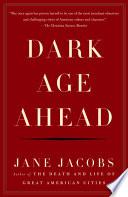Quotes from book
Dark Age Ahead

Dark Age Ahead is a 2004 book by Jane Jacobs describing what she sees as the decay of five key "pillars" in "North America": community and family, higher education, science and technology, taxes and government responsiveness to citizen's needs, and self-regulation by the learned professions.She argues that this decay threatens to create a Dark Age unless the trends are reversed. Jacobs characterizes a Dark Age as a "mass amnesia" where even the memory of what was lost is lost.
“Credentialing, not education, has become the primary business of North American universities.”
Source: Dark Age Ahead (2004), Chapter Three, Credentialing Versus Educating, p. 44
“Redundancy is expensive but indispensable.”
Source: Dark Age Ahead (2004), Chapter Seven, Unwinding Vicious Spirals, p. 159
“In wretched outcomes, the devil is in the details.”
Source: Dark Age Ahead (2004), Chapter Seven, Unwinding Vicious Spirals, p. 153
Source: Dark Age Ahead (2004), Chapter Five, Dumb-Down Taxes, p. 103
Context: Subsidiarity is the principle that government works best — most responsibly and responsively — when it is closest to the people it serves and the needs it addresses. Fiscal accountability is the principle that institutions collecting and disbursing taxes work most responsibly when they are transparent to those providing the money.
“This is both a gloomy and a hopeful book.”
Source: Dark Age Ahead (2004), Chapter One, The Hazard, p. 3
Context: This is both a gloomy and a hopeful book.
The subject itself is gloomy. A Dark Age is a culture's dead end. We in North America and Western Europe, enjoying the many benefits of the culture conventionally known as the West, customarily think of a Dark Age as happening once, long ago, following the collapse of the Western Roman Empire. But in North America we live in a graveyard of lost aboriginal cultures, many of which were decisively finished off by mass amnesia in which even the memory of what was lost was also lost. Throughout the world Dark Ages have scrawled finis to successions of cultures receding far into the past.
Source: Dark Age Ahead (2004), Chapter One, The Hazard, p. 3
Context: This is both a gloomy and a hopeful book.
The subject itself is gloomy. A Dark Age is a culture's dead end. We in North America and Western Europe, enjoying the many benefits of the culture conventionally known as the West, customarily think of a Dark Age as happening once, long ago, following the collapse of the Western Roman Empire. But in North America we live in a graveyard of lost aboriginal cultures, many of which were decisively finished off by mass amnesia in which even the memory of what was lost was also lost. Throughout the world Dark Ages have scrawled finis to successions of cultures receding far into the past.